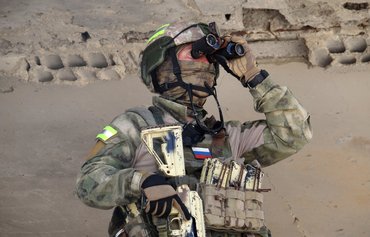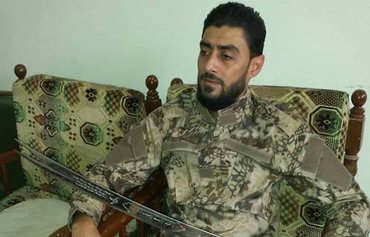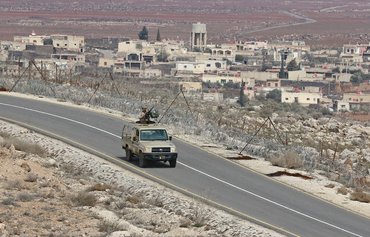Violent clashes have broken out between local armed groups in southern Syria and groups that have pledged allegiance to the "Islamic State of Iraq and Syria" (ISIS) since the end of October, with much of the fighting taking place in Daraa province.
The fighting has killed or wounded a large number of combatants on both sides, and a large number of civilians have been displaced from the flashpoint areas.
There has been "heightened tension" in Daraa after it came to light that "a number of local groups have pledged allegiance to ISIS", Daraa activist Jumaa al-Masalmeh told Al-Mashareq.
These groups are led by Youssef al-Nabulsi, an ISIS emir; Mohammed al-Masalmeh ("Hafou"); Muaid Harfush ("Abu Taaja") and Rami al-Salkhadi, all of whom are members of the Khaled Ibn al-Walid faction.
![Smoke rises from homes that caught fire during fighting between ISIS and local factions in the southern Syrian city of Daraa on October 31. [Horan Free League]](/cnmi_am/images/2022/11/22/38620-daraa-fighting-fire-600_384.jpg)
Smoke rises from homes that caught fire during fighting between ISIS and local factions in the southern Syrian city of Daraa on October 31. [Horan Free League]
![The explosives and mines seen here in a Daraa al-Balad hideout on July 11 were left behind by ISIS elements. [Daraa 24]](/cnmi_am/images/2022/11/22/38622-daraa-ISIS-mines-600_384.jpg)
The explosives and mines seen here in a Daraa al-Balad hideout on July 11 were left behind by ISIS elements. [Daraa 24]
Khaled Ibn al-Walid has pledged allegiance to ISIS.
Their ISIS affiliation "was discovered by chance in the wake of a series of assassinations they carried out, in addition to the similarity of the methods used in the bombings and assassinations to those used by ISIS", he said.
ISIS infiltration with IDPs
The purge of ISIS-affiliated groups and elements is being carried out by some local groups, led by the 8th Brigade of the Russia-backed 5th Corps, al-Masalmeh said.
"The fighting began in the city of Jasim and ended after the killing, capture and flight of most of the ISIS elements," he said.
But there is still fighting in Daraa al-Balad, he said, particularly in the vicinity of al-Sad street, where some ISIS elements are holed up in private houses.
"Tribal leaders succeeded in imposing a temporary ceasefire to get civilians out and to try to find a peaceful solution to end the ISIS presence," he said.
But after several meetings, no agreement was reached between the combatants.
Al-Masalmeh said the fighting left dozens of militants dead and wounded on both sides, in addition to civilians, especially during the first days of the fighting.
As for the ISIS elements, al-Masalmeh said, they are "a mix from all parts of Syria with a small number of non-Syrians".
"They succeeded in infiltrating the area as internally displaced persons (IDPs), and communicated with the local leaders of some groups and established their own 'emirate', and even set up their own sharia court in the city of Jasim."
ISIS presence in the south
Southern Syria, and Daraa province in particular, is among the likelier areas to have an ISIS presence, Syrian lawyer Bashir al-Bassam told Al-Mashareq.
One reason for this is the area's rugged terrain, "which contains a large number of rocky caves that are difficult to monitor", he said.
ISIS elements also infiltrated the area as IDPs and used forged identity cards belonging to deceased people, exploiting the region's economic hardship to recruit former members of various armed groups, al-Bassam said.
Even if ISIS's headquarters were wiped out, he said, that would not mean the end of its presence in southern Syria, because its elements are spread out in all the villages and towns of Daraa province.
Singly or in pairs, "they carry out terrorist attacks, bombings and assassinations to sow chaos in order to infiltrate and spread in the province", he said.
Al-Bassam said the widespread presence of ISIS in the Daraa region is "very suspicious in its timing and the way in which it was uncovered".
He noted that "the fighting coincided with the visit by the Russian foreign minister to Jordan to discuss security of the border region between Syria and Jordan".
During the meeting, the two sides reportedly discussed the possibility of the Syrian army taking over this task instead of the widespread deployment of militias affiliated with the Islamic Revolutionary Guard Corps (IRGC), he said.
Tribal character
Southern Syria has a tribal character that influences all security, military and social aspects, former Free Syrian Army officer Riyad Shahoud told Al-Mashareq.
"This time, ISIS exploited this opening very well," he said.
The leaders of the local groups in Daraa who recently pledged allegiance to ISIS "belong to the major tribes such as al-Masalmeh and Aba Zeid, and hence the confrontation will take longer than it should", he said.
This is out of concern for civilians, primarily, Shahoud said, and because the negotiations between tribal elders to end the fighting will take time.
He noted that the participation of the 8th Brigade in the fighting is significant as it is the only former opposition faction that reconciled with the Syrian regime and was allowed to keep its medium and heavy weapons.
The other groups are armed only with personal weapons and light machine guns, which render them useless in fighting ISIS, he said.

![Elements of various armed groups clash with ISIS in Daraa on October 31. [Daraa 24]](/cnmi_am/images/2022/11/22/38621-daraa-armed-groups-600_384.jpg)






